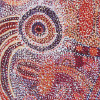Meet Sarah Nur. Her journey from a fishing village living in backpackers digs, to pursuing three maths and science degrees is a testament to the power of self-determination. This is how a girl from Lombok made her way to UniSA.
Welcome to the summer of 2014. That’s me in the pink dress at the opening of Bendigo and Adelaide Bank’s new head office. At the time I was just twenty-five and was selected to speak alongside our Chairman, Managing Director, and the (then) Prime Minister, Tony Abbott.
I was raised in the village of Senggigi, Indonesia. I am of Sasak descent, I’m a proud Indonesian-Australian and I work as a Data Scientist in one of Australia’s biggest retail banks. I’ve come a long way from West Nusa Tenggara.
Read more...
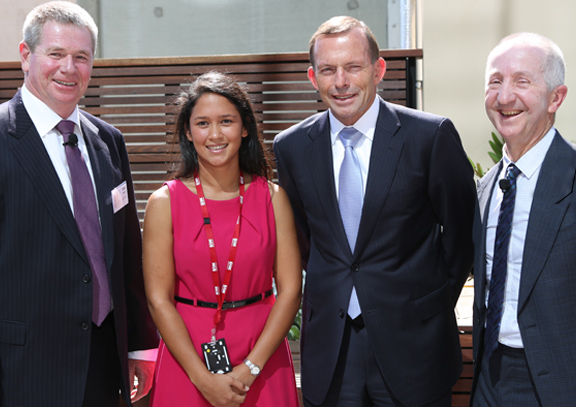
Sarah at the opening of Bendigo and Adelaide Bank’s new head office alongside Chairman, Managing Director, and the (then) Prime Minister, Tony Abbott.
Our Donors are Helping Write Success Stories
100% of your gift will have an impact
When you give a gift to the UniSA Scholarship Fund, every dollar goes to empowering our students and changing their lives. The University of South Australia is a deductible gift recipient. All donations to the UniSA Scholarship Fund are tax deductible depending on your personal tax circumstances.
Contact us
Get in touch with our Advancement Services team by email, or contact a specific staff member

Arun Thomas
Bachelor of Nursing (Class of 2014)
May 2019. It’s the 7 NEWS Victorian Young Achiever Awards and I’ve just won Young Achiever of the Year, the People’s Choice Award, and the Royal Flying Doctor Service Victoria Regional and Rural Health Achiever Award. It’s a long way from Pala, India.
I was born in a South Indian village on the banks of the Meenachil River, 650 kilometres from Chennai. My siblings and I grew up surrounded by lush highlands, rice paddies, colonial bungalows and rubber plantations. Imagine pastel coloured concrete houses with lines of washing strung across front doors. Our family including my grandparents who lived with us are of Malayalam descent, meaning native to the Kerala region. I attended the primary school in the village, and the high school around thirty minutes from our home.
As a teenager I decided that I wanted to study overseas and dreamt that I might be able to go to Australia. My father agreed to help me if I could achieve above 90% in my Year 12 studies. As a student who had always prioritised social activities above hitting the books, this didn’t come easy. I now had strong motivation to do my best! Australian tertiary admissions entrance scores were also high and so I had a two-fold reason to succeed. Much to the surprise of my teachers I achieved 96%.
I chose to come to Adelaide and was accepted into a Bachelor of Commerce at the University of South Australia, commencing in 2008. As promised, my parents funded my education. I obtained a Certificate III in Aged Care and got a job as a personal care worker to assist with my costs of living. However, things didn’t quite go according to plan.
My English was poor and I was struggling with basic communication. Aussie slang, the accent, and the speed at which locals spoke was difficult for me to understand. At just 18 years old I was living independently for the first time in my life in a foreign country, and was trying to cope with managing the unfamiliar environment away from my family and friends. During the second year it dawned on me I had made a terrible mistake.
My part-time job made me realise I wanted to pursue a career where I could help people and quite simply, I wasn’t enjoying Commerce. I was miserable and decided to drop out. Predictably, my parents were not at all supportive of my choice. They felt I was wasting their investment and insisted I complete the degree. I explained I wanted to change my course – that nursing was my real passion – but they weren’t convinced. It led to a major falling out.
In 2010 I went to India for my sister’s wedding and my parents informed me they were withdrawing all financial support. I returned to Australia and we didn’t speak for several years.
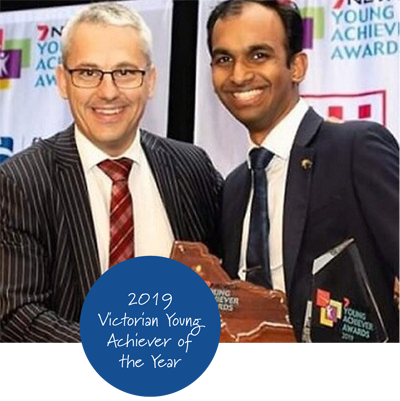
Back in Adelaide I started studying a Diploma of Enrolled Nursing at TAFE to gain the necessary credit to enter a Bachelor of Nursing. Little did I know that things were about to get very hard indeed. Unexpectedly, my flatmates decided to move interstate and I became responsible for all the rent. I was also made redundant from my job as part of a change in ownership at the nursing home. Making things worse, I was estranged from my family. I had no financial support and no job. It was an awful time in my life. Unable to support myself, I wound up living in my car for three months and depression took over.
I suppose a sense of pride prevented me from fully conveying the difficulties I was experiencing and as a naturally shy person I kept most of my struggles to myself. Despite it all, I held onto my faith which gave me hope that there was a light at the end of the tunnel. I am thankful that some friends eventually helped me find a job, and my finances and living situation improved somewhat.
I took my chances and entered the UniSA Bachelor of Nursing program. Extraordinarily I was awarded an undergraduate scholarship valued at $10,000! I felt I was somehow being rewarded for following my dreams. The scholarship came at just the right time and I can’t tell you what a difference it made.
Trying to complete study and finance it at the same time, is a big factor in student drop-out rates. I know firsthand that having the funds to continue study gives a student one less thing to worry about and allows them to focus purely on their degree.
The scholarship meant so much to me, especially as an international student. It was an extraordinary feeling to know that donors believed in me, particularly at such a critical point.
My life turned around and I started to get involved in student activities. I’ve always been passionate about leadership and wanted to be someone that my fellow students looked up to. I wanted to inspire people. After being elected as student representative for City East Campus I ran for and was elected President of the UniSA Student Association (USASA). During the two terms I served I was also a member of University Council and Academic Board. I have an Honorary Life Membership to USASA and was the first international student to receive this honour.
In my final year of Nursing I particularly enjoyed studying Health of Adults and Health of Older Adults subjects and was able to apply my knowledge in a real clinical setting during two hospital placements. When I was younger, my family cared for my grandmother within our home environment right up to her passing. I am certain this early experience contributed to my interest in the aged care sector.
When I finally crossed the stage as a Nursing graduate it was the proudest moment of my life. I reflected on the past five years with great satisfaction, realising I had battled through adversity and succeeded. It was also around this time that my parents and I reconciled.
My passion for social and humanitarian causes continued beyond university. I have been a member of Australian Red Cross for many years and in 2015, I was appointed to its South Australian Advisory Board. I also sat on the board of directors for Carrington Cottages Management Inc. providing policy leadership to tackle the issue of homelessness.
After working as a Registered Nurse in Adelaide I moved to Horsham to take up a role at Edenhope & District Memorial Hospital as Associate Nurse Unit Manager. I also provide strategic leadership at Stawell Regional Health as one of its youngest board members.
I suppose it was my enthusiasm for what I do that led to the 2019 Victorian Young Achiever Awards nomination for extraordinary leadership in rural and regional health and aged care. I consider it a privilege to be able to care for the elderly in our communities. Last year I received the Victorian Celebrating Aged Care Leadership Award for my work in palliative and advance care. In 2016 I received the Channel Nine South Australian Young Achiever People’s Choice Award. My achievements are now being recognised.
My journey may be seen as a success-story, but back when I was struggling with depression and homelessness, I can tell you that the scholarship was the main turning point that I needed to change my future.
As I write to you, I am mindful there are students currently battling their own difficult circumstances. I firmly believe that generosity can make a huge impact. A scholarship can be the jump start that someone needs to pursue their passions and change the world.
For this reason, I decided to become a donor myself and established a Leadership Scholarship for Aboriginal and Torres Strait Islander students in 2018. It supports those who demonstrate motivational leadership and social responsibility while balancing their studies.
I am doing so much more than I ever thought I would and living a better version of the future than I ever imagined. I wouldn’t be where I am today without that scholarship. Someone believed in my future, ignored the stereotypes and encouraged me to be the best I could be. I am inviting you to do the same.
By making a donation to this year’s Scholarship Appeal your help can be a game-changer for a young person starting out.
An act of faith ensures a better tomorrow for those who need a little extra help today.
When you give, you are saying with your actions that this is important to you – that you are getting behind students like me.
Generosity takes conviction. With everything going on in our busy lives, it requires a certain strength of character to think of others.
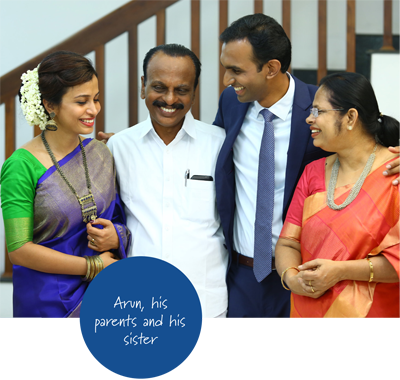
Right now, there are deserving students with worthy dreams and aspirations, and whatever personal challenges they may face I can assure you a scholarship can be the one thing they need to change their life forever.
Will you support them?
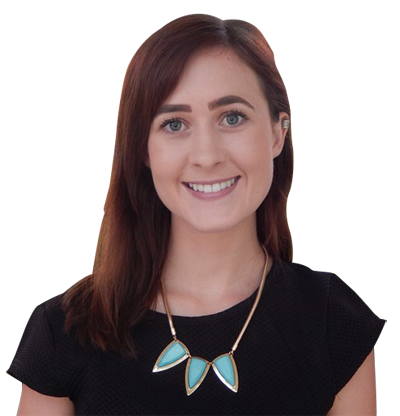
Jesse
Masters of Teaching (Secondary) (Class of 2017)
Bachelor of Visual Arts (Drawing) (Class of 2015)
Living and working in the fourth-worst borough in London can be tough. In the suburb where Jesse teaches, English is not the first language for 82% of her students. Poverty and long-term unemployment are the norm.
But Jesse believes in the power of education to change lives. It changed hers.
I was raised on a farm in the Riverland, 250 kilometres northeast of Adelaide. Loxton was our nearest town. We were a close-knit family and my childhood is full of memories of my sister, two brothers, and I helping out on the farm, and long commutes to school and back each day on the bus. Term breaks were for camping trips – usually combined with educational experiences.
Although I cherished life in rural South Australia, I yearned for adventure. Day trips to Adelaide were a rare novelty and I used to be excited to see what the ‘city kids’ were up to. I decided when I grew up, I wanted to experience life outside our small community and have a job that could take me anywhere in the world. Tertiary education was something I aspired to in order to get there.
Throughout school I was always interested in teaching and I worked hard during Year 11 and 12 to get the best ATAR score I could. A random conversation with someone towards the end of my schooling was serendipitous. They suggested I apply for a UniSA Rural Reconnection Relocation Scholarship, ‘just to see what happens’.
Not everyone is eligible for Centrelink, and not everyone has a family who can support them while living away from home. Several family friends had already had to give up study and move back home from university due to their own or their family’s inability to support them financially.
When I discovered I had been awarded the scholarship I was thrilled! A dream that would have been otherwise out of reach was now a reality. Removing the worry about how I would afford text books or rent made all the difference to me and my family, and it felt like my hard work had paid off.
I was interested in becoming a visual arts teacher and so enrolled in both a Bachelor of Visual Arts and a Master of Teaching. This gave me the opportunity to work across a wide range of specialty subject areas as well studying professional teaching disciplines. I had access to state-of-the-art facilities, surrounded by like-minded people, and as a result was able to make lots of new friends.
Being able to give back was important to me and I volunteered for the Career Awareness program which engages with secondary school students to raise their aspirations towards university education. The program is a fantastic initiative and it reinforced my desire to work with young people. I also volunteered as a student mentor and led campus tours, STEM workshops, and promoted tertiary education to visiting rural school groups.
I found it very demanding to keep up with my studies as well as travelling home to help on the farm on weekends and holidays, but without financial assistance it would have been impossible. When life became overwhelming, my motivation to continue was the thought of my future and where it could take me. I had come so far, worked so hard and uprooted my whole life to be where I was. With so many exciting possibilities on the horizon, I couldn’t give up.
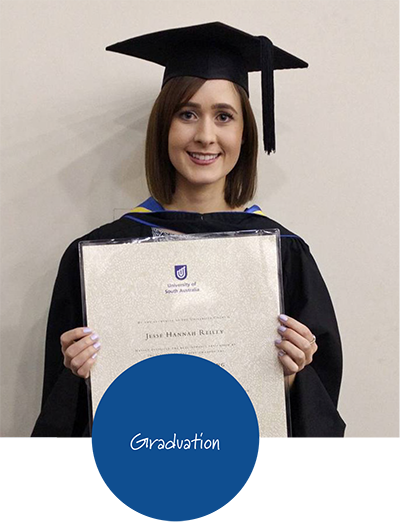
Although beneficial to my growth, my teaching placements were rather challenging. I was placed at ‘tough’ schools in Adelaide’s outer suburbs and days were filled with long drives, juggling lesson planning, staff meetings, after school clubs, and staying late to mark student work. This had to be managed alongside university assignments and part-time employment – a very fine balancing act. When it all seemed too much to handle, it was encouraging to remember that donors believed in me and wanted me to succeed.
After graduating, I was thrilled to land my first job in far North Queensland as a distance education teacher. I was teaching students who were unable to attend traditional school environments due to remote location, mental health, or medical issues. Although I never met many of them face to face, I found the role unique and rewarding and it allowed me to broaden my curriculum knowledge across a range of subjects, and even teach vocational education.
At the end of 2017, I successfully obtained a job as a TESOL (Teachers of English to Speakers of Other Languages) and Art Teacher in the UK. I took the plunge and relocated overseas – my childhood dreams finally fulfilled.
My first contract was at a coeducational secondary school with 1400 students located in the London commuter belt. The school was in an economically disadvantaged area where adult learning difficulties and mental health problems were prevalent social issues. I had wanted to develop my teaching practice by working in tough schools, and this was nothing less than a baptism of fire!
At the beginning of 2019, I gained employment at a coeducational secondary school with over 2000 students, located in Brent. The borough is home to large areas of council housing and a diverse transection of society, with many struggling single parent families. It certainly wasn’t easy, but by ‘jumping in the deep end’ I found myself learning strategies to manage challenging behaviour, engage students, and raise attainment.
The irony is these tough experiences living so far from home, have proven invaluable for my personal growth. I never thought I would be as confident in my teaching as I am. Working in the contexts I have and seeing firsthand how education can lift people out of a cycle of poverty and unemployment, I am even more aware of the difference a scholarship made to my own situation.
Low income students face barriers to success at every stage of their education, but I firmly believe that generosity can make a huge impact. It can be the jump start that someone needs to pursue their passions and change the world. That’s where you come in.
I wouldn’t be where I am today if someone hadn’t believed in my future and encouraged me to be the best I could be. By making a donation to this year’s Scholarship Appeal your help can be a game-changer for a young person just starting out.
In my job I have the privilege of helping others overcome barriers that prevent them from reaching their goals. I am inviting you to do the same. When you give, you are saying with your actions that this is important to you – to get behind students like me.
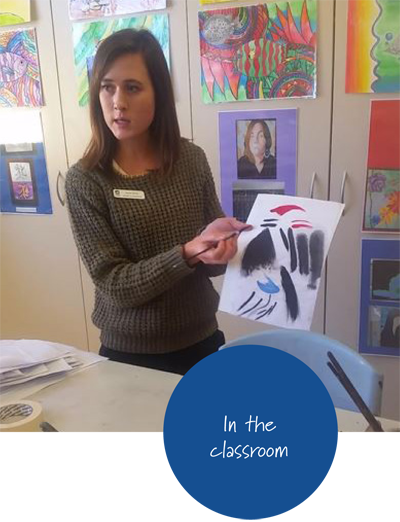
Right now, there are deserving students with worthy dreams and aspirations, and whatever personal challenges they may face I can assure you a scholarship can be the one thing they need to change their life forever.
Will you support them?
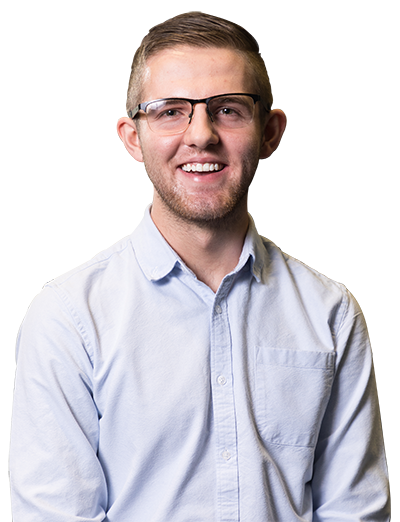
Joshua Schneider
Bachelor of Business (Finance) (Class of 2019)
Bachelor of Commerce (Accounting) (Class of 2019)
Joshua Schneider never thought university was an option. In his mind it was for smart, wealthy people who attended better schools. His path from the outer northern suburbs to UniSA was not one that everyone around him could easily see.
Throughout high school, harbouring a dream of being able to attend university made me rather the odd one out. The majority of students I went through school with never considered tertiary education. Among my social circle, having a family member who had attended university was out of the ordinary.
Students like myself who come from low-income backgrounds, often have the least chance of success. They are less likely to begin university, less likely to finish. Despite this I never felt ‘disadvantaged’. My upbringing was perfectly normal and functional. It’s just that my environment conditioned me to believe that university was for wealthy families from private schools.
Although I didn’t have a clear idea of what my future held, I loved learning. Economics, business, society, culture… I wanted to understand it all. My teachers encouraged my passion for knowledge and because I was performing academically, suggested I apply for entry to university. One of my lifelong personal values is to never pass up an opportunity. I figured it would be a waste not to take advantage of a chance I might have, so I submitted an application for a double degree of Commerce and Business, alongside an application for a High Achievers Scholarship.
I clearly remember the day I received the phone call telling me I had been awarded the scholarship. I went home to announce to my excited family that university had just become a reality, with the burden of financial pressure now lifted. That moment is something I will never forget.
I loved university from the get-go. I was so enthused to be there and I was excited to be learning about macroeconomics, financial accounting, business law, and financial markets – all topics that fascinated me. I was getting to know other students and I threw myself into social activities and student clubs. I wanted to give back and couldn’t think of a better way than volunteering as a Student Campus Representative. I really enjoyed this experience advocating for the interests of the student body.
In addition to studying and volunteering I also worked at Foodland throughout university. At best, my schedule was busy. At worst, it was outright crazy. Juggling two degrees, working, paying my own way and trying to help support my family financially was stressful. The scholarship definitely helped.
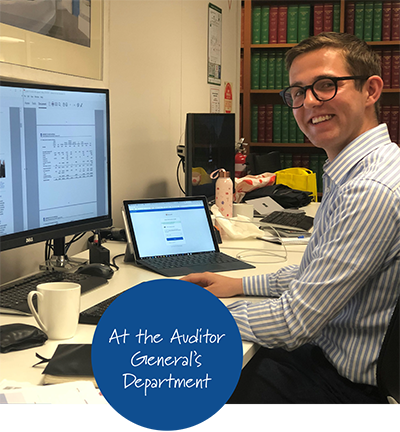
My job allowed me to continue supporting my family, while the scholarship removed the obligation to work more shifts to pay for my own living costs. It would have been so difficult to juggle my finances if not for the generous support I received.
Statistically, first-in-family university students struggle academically and have higher drop-out rates than other students. Gaining admission isn’t necessarily the golden ticket we might like it to be and it’s what happens next that is critical. I always maintained a deep and true awareness that I was the beneficiary of others’ investment. Knowing that donors were cheering for me in my corner made me strive to keep going even when it was tough.
I believe in choice and self-determination. These are guiding principles for me. The first year at university opened my eyes to opportunities that were available, not just academically, but in the real world. Life opportunities, if you like. The future held untold possibilities with the ability to work in a wide range of industries across private, public and non-profit sectors, and in other countries.
I was determined to make the most of all of it. I successfully applied for the High Achievers Summer School grant which saw me spend the 2017 mid-year break in Montreal at a French language school. I always had a keen interest in learning French and the chance to participate in an exchange overseas and explore Canada was again, only made possible because of the generosity of donors – I never would have been able to consider it otherwise. Understanding that individuals were investing in my dreams, reinforced my determination to continue chasing them.
Heading into my final year I applied for an additional scholarship. In the finance sector, internships are crucial for work experience opportunities and for securing post-university employment offers. I knew I would be required to spend significant time completing applications for intern and graduate programs, meaning I would have less time to work.
As things turned out, I was ultimately awarded the scholarship and it meant the world to me, especially when I received an offer to become a Graduate Auditor at the Auditor General's Department – the result of one of my hard-won internships.
On day one of my first professional job I was struck by a sense of my hard work having paid off. But it wasn’t just my efforts that got me to the finish line. My journey was underpinned by the belief of others. I feel such a sense of gratitude to those who helped me. If you asked me five years ago about my future ambitions I probably would have said “to get a job and a house”. I now have a different idea of what success means. It’s about being empowered, taking responsibility, and giving back.
Low-income students face barriers to success at every stage of their education in spite of their academic achievements. I firmly believe that generosity can make a huge impact. It can be the jump start that someone needs to pursue their passions and change the world.
That’s where you come in. By making a donation to this year’s Scholarship Appeal your help can be a gamechanger for a young person just starting out.
I wouldn’t be where I am today without that scholarship. Someone believed in my future, ignored the stereotypes and encouraged me to be the best I could be. I am inviting you to do the same. When you give, you are saying with your actions that this is important to you – to get behind students like me.
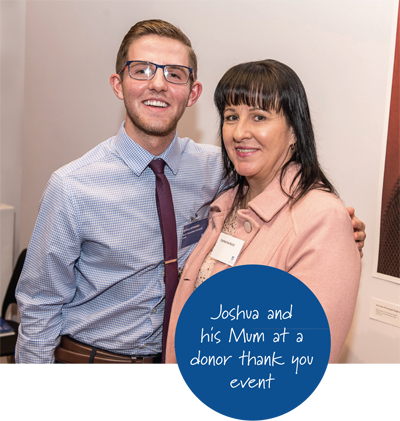
Generosity takes conviction. With everything going on in our busy lives, it requires a certain strength of character to think of others.
Right now, there are deserving students with worthy dreams and aspirations, and whatever personal challenges they may face I can assure you a scholarship can be the one thing they need to change their life forever.
Will you support them?
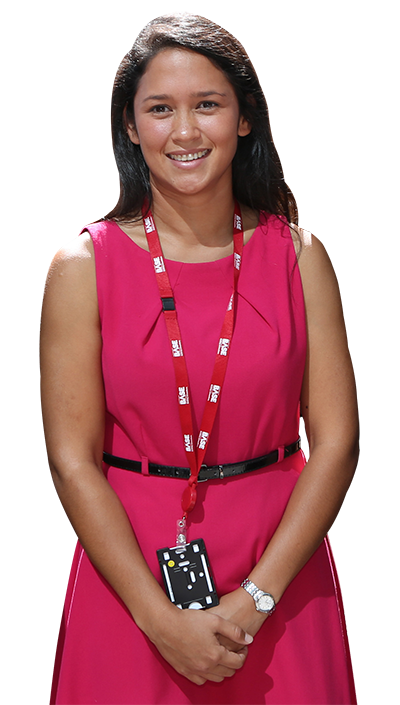
Sarah Nur
Bachelor of Quantitative Finance (Class of 2011)
Bachelor of Applied Science (Honours) (Industrial & Applied Mathematics) (Class of 2013)
Meet Sarah Nur. Her journey from a fishing village living in backpackers digs, to pursuing three maths and science degrees is a testament to the power of self-determination. This is how a girl from Lombok made her way to UniSA.
Welcome to the summer of 2014. That’s me in the pink dress at the opening of Bendigo and Adelaide Bank’s new head office. At the time I was just twenty-five and was selected to speak alongside our Chairman, Managing Director, and the (then) Prime Minister, Tony Abbott.
I was raised in the village of Senggigi, Indonesia. I am of Sasak descent, I’m a proud Indonesian-Australian and I work as a Data Scientist in one of Australia’s biggest retail banks. I’ve come a long way from West Nusa Tenggara….
From when I was very small my parents ran a backpacker’s hostel – the first tourist accommodation in our region – located on the northwest coast of the island of Lombok, near the Gili Islands. We had around two hectares of land and kept chickens which were raised for meat. Our village was basically an unsealed road and maybe 100 houses, separated by alleyways just wide enough for motorbikes to pass. Horse-pulled carts rambled alongside small covered pick-up trucks or ‘bemos’ loaded with vegetables for market, and fast food chains were non-existent. In front of our home was a sandy beach and behind, bright green rice fields with mountains in the background.
I followed the typical path of girls in our village and started attending school in Mataram – the island’s largest town – around half an hour away where I was Head Girl in most of my classes. After school I would come home to help in the hostel. I loved being able to meet people from all over the world and it was a good chance for me to practice my English. There were frequent power black outs and I have many memories of doing homework by candlelight.
When I was twelve, my parents’ marriage ended and my father remarried. My mother who had always dreamed we might receive an education in Australia, left Lombok two years later and moved us all to Adelaide.
Coming to terms with a vastly different way of life in Australia was a big adjustment for a fourteen-year-old. On my very first day of school I came home and asked my Mum how to say, “I hate school” in English. Year 9 is a difficult period for teenagers generally, but as an outsider trying to fit in it was even more complicated. Everyone already had their cliques and I was the newgirl with an accent, struggling to master the language. I was ‘different’.
It was amusing to observe Australian teenagers’ outlooks on life. Some of my classmates thought having to catch the bus to school instead of being driven was the end of the world. But I didn’t judge them. I knew their experiences growing up were different from mine.
Far from the high-achiever I had been all my life, I now grappled with subjects where I had to translate English back to Indonesian in my head to understand it. Only mathematics with its common universal language felt familiar – it was logical and I was able to see patterns and grasp the concepts easily. It ended up being my favourite subject.
I have always had rather thick skin and gradually my natural resilience came to the fore. When I was teased for the way I spoke I would turn it around into a joke and make people laugh. I learnt not to take things personally. If I didn’t easily fit, I would make my own way.
Year 12 was a tough year. I suppose it is for most students, but for me it was the year I lost my Dad. He had been diagnosed with diabetes earlier in his life, and in 2007 he suffered a fatal heart attack. Despite being in a different country to his children, he had devotedly maintained a connection with us and had been to visit on several occasions.
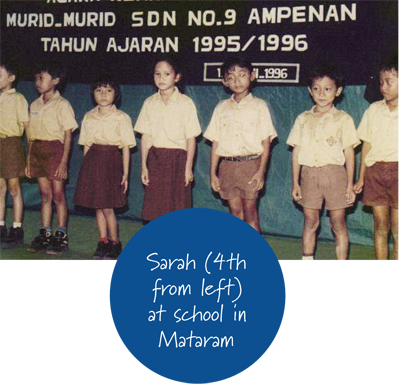
The year raced by and there were decisions to make about what I was going to do with the rest of my life. I knew I wanted to continue studying but wasn’t sure what to do. Dealing with my Dad’s death I simply didn’t have the energy or inclination to think about anything long term. I thought the only career in which maths might be useful was Engineering, which didn’t interest me. When I happened to come across an advertisement on the back of a Year 12 exam preparation book for the UniSA SA Water Hypatia Scholarship, it changed my life.
Until then, I wasn’t aware that you could study mathematics degrees at university. The scholarship was being offered to female students enrolled in a Bachelor of Quantitative Finance, and after making some initial enquiries, I applied. I succeeded in achieving the requisite ATAR in my Year 12 results and was extremely honoured and privileged to be awarded the Scholarship over three years, commencing at UniSA in 2008.
Being able to study in a field that I enjoyed and could make a career out of was exciting and encouraged my sense of ambition. Subjects were split equally between finance and mathematics – generally Finance degrees are popular whereas not many people tend to study Mathematics. It was interesting to have one lecture where there was two hundred people in the room, and then going into the next where there was only five!
Receiving the scholarship provided significant and welcome financial support. I worked part-time as a waitress but I would have needed to work many more hours and compromise my grade point average were it not for the scholarship. But it was more than just the money; what drove me was the knowledge that others believed in me and my potential to be successful as a woman in a traditionally non-female field. I think there’s a lot to be said for sheer optimism and positivity in all situations and the belief that you can do anything if you’re given the opportunity.
In my final year I was fortunate to participate in a Financial Mathematics semester exchange to the University of Twente in the Netherlands which was an amazing experience. After returning I decided to enrol in a Bachelor of Applied Science (Honours) (Industrial and Applied Mathematics) which I completed in 2012. I was selected into the graduate program at Bendigo and Adelaide Bank soon afterwards.
My first day on the job was nerve wracking yet very exciting. The two year program had us on rotations in different departments within the Bank and I spent time in Finance, Risk, and Products. I thoroughly enjoyed the experience I gained in analysing real-life data. At the end of the program I was offered a role as a Financial Analyst and a year later successfully progressed to Product Analytics Manager. In 2017 I commenced a Masters degree in Data Science at UniSA and was offered a Data Scientist position within the Customer Analytics and Insight team – a role I have been in for two years.
I am very proud of working for a bank which has a strong regional presence and locally governed branches. Our Community Enterprise Foundation directs charitable funds into hundreds of causes, with profit going back to local communities. This is important to me because I recognise that the generosity of others was transformative in my own journey.
Generosity can make a huge impact. It can be the jump start that someone needs to pursue their passions and transform their world. My achievements are not just my own. They can be attributed to the sacrifices my mother made and the vision and support of donors. Looking back to the girl I was playing on an Indonesian beach, I am aware that I owe so much to the kindness of others.
Right now, there are other students like I was, with worthy dreams and aspirations, and whatever personal challenges they may face I can assure you a scholarship can be the one thing they need to change their life forever.
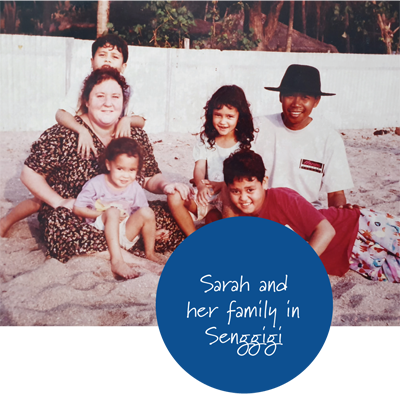
When you give, you are saying with your actions that this is important to you – that you are getting behind students like me.
That’s where you come in. By making a donation to this year’s Scholarship Appeal your act of faith ensures a better tomorrow for those who need a little extra help today.
I wouldn’t be where I am today without that scholarship. Someone believed in my future and encouraged me to be the best I could be. I am inviting you to do the same.
Generosity takes conviction. With everything going on in our busy lives, it requires a certain strength of character to think of others. In giving to the Scholarship Appeal your help can be a genuine gamechanger for students starting out.
Will you support them?
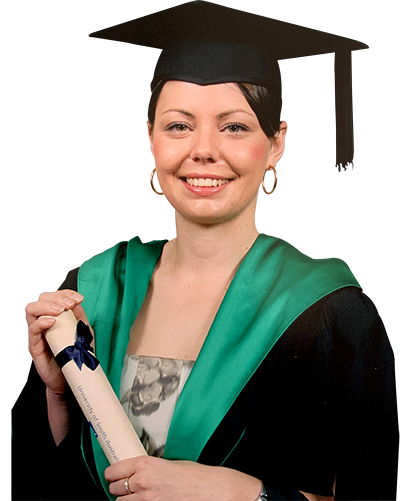
Kylie May
Bachelor of Engineering (Civil) with Honours (Class of 2010)
In high school she thought the engineers life was out of reach. Engineers are mostly men – would she be accepted into their ranks? But it never crossed her mind to give up. She knew who she was and what she was capable of.
Meet Kylie May…
I was always an engineer in the making, even if it took me a while to realise it. My folks are from the town of Gawler – a semi-rural outer northern suburb of Adelaide – and our family of five lived on a small holding with livestock. My two older sisters and I attended Trinity College, an Anglican day school.
Ours was a musical family but we also loved sport, and weekends were always busy with local and district tennis matches. One of our favourite pastimes was ‘going up the river’ [the Murray] and I have great memories of long weekends and summer holidays spent swimming, getting sunburnt, and mucking around in boats.
In my final year of school my parents built a new house and I became absorbed in the building process. I’d had early aspirations towards architecture during school, but soon realised I didn’t have the flair for design. What interested me most was the numbers behind the scenes. Observing the construction of our new home, I thought, ‘This is what I want to do’.
Getting an education and working hard was ingrained by my parents. It was an inherent family value that I embraced well before high school. When it came to researching higher education options I stumbled across Engineering and it appeared to align perfectly with my fascination. For me, engineering was about putting a rationale to all of this curiosity that I had.
I chose University of South Australia because of its reputation for offering a practical, hands-on as well as technical education. I was genuinely honoured when I learnt I had been awarded a scholarship available to women studying engineering. It felt good to know that donors believed in women practicing the discipline and were backing my pathway.
I commenced a Bachelor of Civil Engineering with only two other girls and we formed a friendship and offered one another support. It was an overwhelming experience showing up and starting with 145 males!
The more I studied, the more I realised that this was my calling, but I didn’t have the best grades for the first two years. The extra push came because I needed a distinction average to be eligible to undertake Honours in my fourth year. I badly wanted to show my family I could do anything and prove to myself that a female could make it too. Years of being outnumbered by males in classes created a desire to be as self-sufficient as possible. I knew I could do it if I pushed myself, and I did.
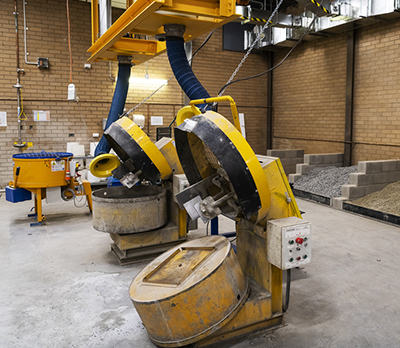
In addition to financial support the scholarship offered three months of paid vacation employment at the Department of Planning, Transport and Infrastructure. For me this was the most valuable aspect. To gain work experience in the field that I could include on my CV and valuable networking opportunities was such a bonus. After placement I went on to complete Honours. The scholarship really helped me believe in myself, that it was possible for me to succeed.
My first job after university as a graduate engineer was for Fulton Hogan at its bitumen plant. On my first day I was absolutely terrified. I felt completely out of my depth – a young girl in a laboratory full of males. Even though I was an ‘Engineer’, I knew nothing compared to my highly skilled colleagues, many of whom had years of experience.
But I was not deterred. I was given the opportunity to work on the Northern Expressway as a Site Engineer and on a project for the removal and replacement of the King Street Bridge at Glenelg over the Patawalonga River. I was in charge of permits, inspection test plants, quality control, and environmental issues, and I also gained experience in contract management.
However, it was in obtaining my next job that the value of the scholarship was fully realised. After two years at Fulton Hogan I was offered a role as Traffic Engineer at the Department of Planning, Transport and Infrastructure. Those connections made three years earlier during the scholarship placement had paid off. It was a stark reminder that I wouldn’t be where I was without the belief and generosity of others.
I worked for three years at DPTI in Traffic Investigations and as a Planning Engineer in the Network Unit team on Black Spot projects and the Main South Road North-South Corridor management plan. In 2014, I accepted a role at the City of Adelaide in the Asset Management team, managing and planning roads and footpath renewal programs. Twelve months later I was offered the position of Project Manager, a role in which I have served for the last five years.
I love the responsibility of managing a project end-to-end – I have worked on creek rehabilitation, landscapes and playgrounds among other things, and it is so rewarding when I see the success of a project being enjoyed by local families.
I am doing so much more than I ever imagined I would back at university and am thrilled that I’ve come this far in a traditionally non-female environment. It was only possible because of the willingness of others to get behind my dreams and ambitions. I firmly believe that generosity can make a huge impact. It can be the jump start that someone needs to pursue their passions and change the world.
I wouldn’t be where I am today without that scholarship. Someone believed in my future, ignored the stereotypes and encouraged me to be the best I could be. I am inviting you to do the same. By making a donation to this year’s Scholarship Appeal your help can be a game-changer.
By giving to the University of South Australia’s Scholarship Fund, your act of faith ensures a better tomorrow for those who need a little extra help today.
When you give, you are saying with your actions that this is important to you – that you are getting behind students like me.
Generosity takes conviction. With everything going on in our busy lives, it requires a certain strength of character to think of others.
Right now, there are deserving students with worthy dreams and aspirations, and whatever personal challenges they may face I can assure you a scholarship can be the one thing they need to change their life forever.
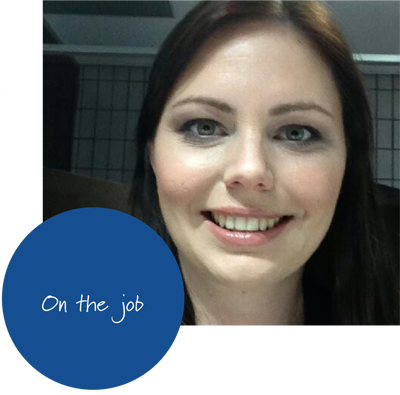
Will you support them?
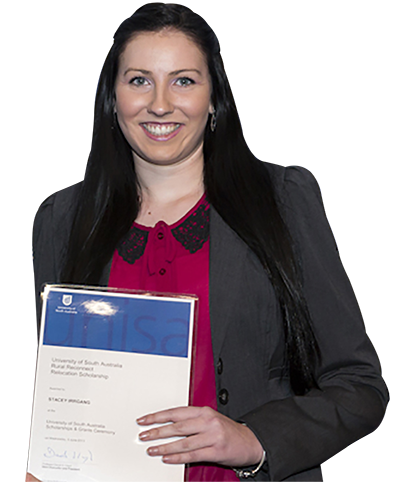
Stacey Irrgang
Bachelor of Psychology (Honours) (Class of 2017)
At first glance, Stacey Irrgang is the poster girl for success – a country girl from a salt-of-the-earth family in rural SA, a Psychology graduate working in the field, and a dedicated community volunteer.
But she says her most impressive achievement has been finding her way back from tragedy.
As the older of two girls, I grew up on a large cattle farm about 100 kilometres north-east of Adelaide as part of a tight-knit livestock community. Our family lived on a 5000 head feedlot – my father was General Manager of the facility – and my sister and I commuted forty kilometres each way to attend school in Nuriootpa. Weekends were for riding motorbikes, long walks, and tending animals. Our nearest neighbours were over a kilometre away, so it was a relatively quiet life.
My parents Mark and Jenny worked in labour intensive jobs and instilled a strong work ethic into us. When I was not quite fifteen, I started working at the local hotel, but they always encouraged me to study hard and aim towards a career. I enjoyed helping others and this developed into an interest in psychology during high school, leading me to enrol at University of South Australia after attending open days and speaking with students and staff. I was interested in learning about how the brain works, human behaviour, and how to research it.
Although I received an offer, my family would struggle to pay for my relocation to Adelaide, making the prospect of confirming a place financially impossible. So, when I was told I had been awarded a Rural Reconnection Relocation Scholarship it felt like a huge weight had been lifted off my shoulders. I remember calling Mum and yelling into the phone that I had been successful. It was so great to get help to pursue a career outside of farming which was all home really had to offer. I felt overwhelmed by the generosity. It was like, I wanted to prove to the donors that I would be successful, making sure their donation was worthwhile.
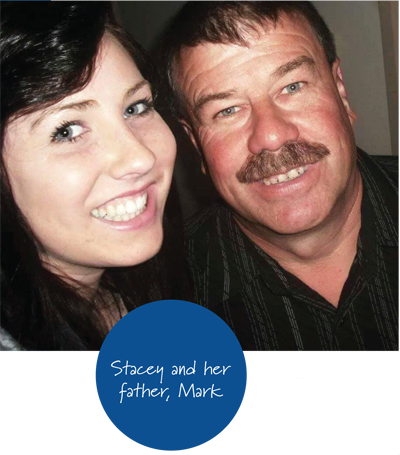
As a new student I found it easy to make friends which helped me feel like I had a family away from home. But adjusting to living so far away took some getting used to and the first semester was pretty nerve-wracking. A month after I moved to Adelaide, my father took his own life.
My family was devastated, and our entire community was rocked. Dad loved farming, motorbikes and mechanics, he served as a CFS member and was Chair of the School Council. He was a true pillar of the community, but he was also a pillar of our family, and then he was gone. The loss took a significant emotional toll and at times it was incredibly difficult for me to keep going.
I experienced first-hand what devastation a lack of access to services and isolation can cause and it made me even more motivated to pursue a Bachelor of Psychology. Continuing my studies in the very worst of circumstances required all of the grit and resilience I possessed, and I couldn’t have done it without the support of my family and friends. I would continually remind myself that I was doing this degree so that I could help others, and that is what got me through.
Processing what had happened while studying, working part-time, and supporting my mum, my sister, and grandparents was hard. I felt like I was constantly juggling demands and there was rarely a day I had to myself. As well as my dad’s suicide, our family also had to deal with the death of my grandfather during my final year. I am so grateful that the scholarship was there to fall back on. Without it I would have had to reduce my study so I could work enough hours to pay the rent.
Two years after Dad died, I began volunteering as a Suicide Awareness and Prevention Advocate. It was proactive and helped give purpose and meaning to my life. I got a lot out of contributing to a cause that was really close to my heart and it was a privilege to help others in their darkest moments. I still volunteer at Lifeline Australia and The Ripple Effect.
After graduation I landed a role at Barkuma in the Better Pathways program which is delivered in collaboration with the Department for Education and Child Development. It provides students with one-on-one support and a post-school aspirational plan through long term case management that continues until six months after leaving school.
Although I had faced so many life challenges already, I found myself nervous on the first day, but I needn’t have worried. It was soon clear that my personal values aligned with the organisation and it was exciting putting to use all of the things I learnt throughout my degree and helping others explore their talents and learn new skills. After twelve months I was offered a permanent role in the Lifestyle and Intervention team. I get so much satisfaction from working alongside people with a disability and particularly enjoy helping students from rural areas.
Working in the field for the past two and a half years has allowed me to take the time to process my own pain. I believe in this profession that it is important to look after your own wellbeing so that you are better able to support others. I often remind myself when I am feeling overloaded that, ‘you can’t pour from an empty cup’. Looking ahead I feel ready to start focusing on career progression and would like to undertake postgraduate studies at UniSA and obtain a Masters degree.
My story is undeniably a happy one now. Life keeps going, new challenges emerge, and I know there are other students currently battling their own tough circumstances. I firmly believe that generosity can make a huge impact. It can be the jump start that someone needs to pursue their passions and change the world.
There are many reasons why people may not pursue studying at university. If they are financially supported, it removes one of those obstacles and allows them the chance to overcome significant hurdles. I am proof of that.
I am so aware of the difference a scholarship made to my own situation and how much it meant that donors believed in me and my future. I am evergrateful for the support that I received.
As part of my day-to-day job I have the privilege of helping others overcome barriers that prevent them from reaching their goals. I am inviting you to do the same. By making a donation to this year’s Scholarship Appeal your help can be a game-changer for young people just starting out.
When you give, you are saying with your actions that this is important to you – that you are getting behind students like me.
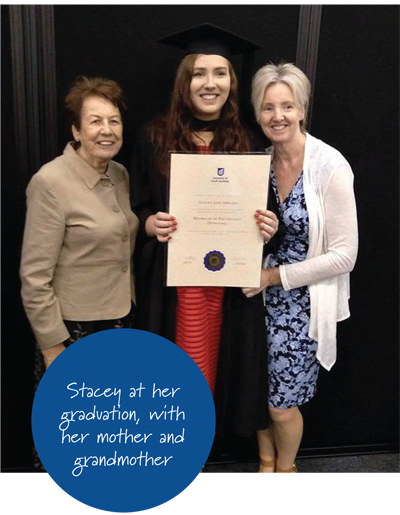
Right now, there are deserving students with worthy dreams and aspirations, unable to realise them simply because they’ve had a rocky start.
Will you support them?
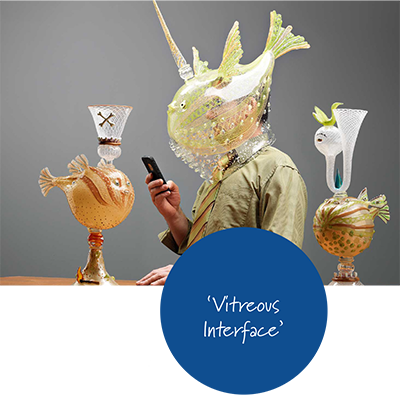
Tom Moore
PhD candidate, University of South Australia
Tom Moore’s work has been described as ‘strange’, ‘beautiful’ and ‘eccentric’. In a sense, that is stating the obvious. According to him, it’s a perpetual state of jest that drives this artist working with blown glass to play with fire.
I started at university in 1991, knowing little else except that glassblowing was what I wanted to do. This I figured out on my own when I was a teenager.
I grew up in the outer suburbs of Canberra in the early 70s – a world away from Capital Hill – in a house full of books and animals. We were encouraged to be activists, non-conformists, committed to social justice. Both of my parents were steadfast unionists and our family travelled to Tasmania during the 1982 ‘No Dams’ protests and attended nuclear disarmament rallies. Glassblowing was not even on the radar.
Some of my most cherished memories are of family holidays, slathered in sunscreen at the beach, and outings to the theatre, attending musicals. We would ride in the car, all of us singing at the top of our lungs. I didn’t realise how lucky I was.
So how did I come to love the journey into imagination so much? My mother was a children’s librarian and I grew up amongst an abundance of stories and pictures. I was exposed to a rich visual education through television and I enjoyed drawing and making things. Lost in imaginative stimuli, the world around me disappeared and hours would pass as I was transported to make-believe fantastical worlds.
In Year 9, I started attending an alternative government school that offered progressive subjects like Fine Art and Social Change. I spent a lot of time drawing and I enjoyed Photography, English, Art and Media Studies. I loved daydreaming about characterisation and narrative, barely even considering what might come after graduation.
One day I saw a glassblowing demonstration and had one thought: “This is whatI want to do.” There is something more than a simple love of drawing or painting that compels people to study the Arts. I was drawn to the danger and dexterity of juggling fire and working with pyrotechnics.
I enrolled in a Bachelor of Arts program with a Glass major and felt like I’d been given a gift – a medium through which I could traject my imagination. Although being a glassblower may seem downright archaic to some, I felt very connected to the history of the Venetian craft and the idea of using an ancient technique that was synchronous with alchemy.
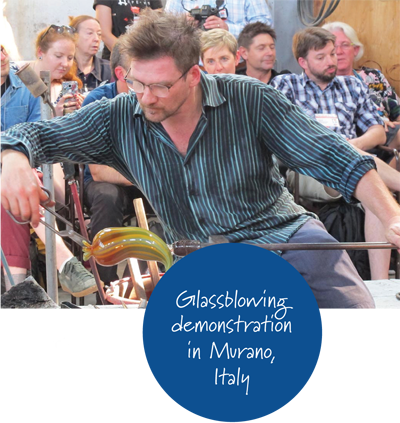
Working with glass is hot, potentially dangerous work. One of the challenges is that to become a truly skilled and intuitive craftsperson takes years of repetitive production. But even as a beginner I was not daunted and was committed to pursuing this career. I wanted to transport people to places they’d never been, the way I had been through illustrations as a child. The idea of doing that with glass thrilled me with possibility.
Studying the Creative Arts is different to other disciplines. You don’t learn data metrics or how to increase productivity. The value is found in learning to understand human nature, to make statements that might be useful and meaningful in the 21st century, and to engage contrarian attitudes. This is at the heart of what I do. Still, to be honest, none of these are why I chose to study Glass. I chose it because I loved it.
It’s not easy to make a living as a creative – the ‘starving artist’ syndrome is well documented – and the struggle, as they say, is real. I have profoundly benefitted from the generosity of others, without which, I would not have the career I have today.
My path after university was a convoluted one. I relocated to Adelaide to train in production techniques in the Associate Program at JamFactory which provides career development for emerging artists. After the conclusion of the program I earned a Fellowship at the Creative Glass Centre of America, and then undertook several national and international residencies. Five years after graduating with a Bachelor of Arts with Honours I was appointed as JamFactory’s Production Manager. In the meantime, I produced studio products, my own giftware designs, and experimental exhibition objects.
Most of my role was engaged in making commissions. I sometimes questioned the value of making more things when the world is already so full of stuff. The pieces I produced weren’t things that anybody really needed. In that sense they were aesthetic choices – luxuries. These misgivings were ultimately balanced by the achievement of creating something never-before-seen that brought joy to other people.
I developed my own exhibition profile in Australia and abroad including New Zealand, Asia, and the United States. In 2001 I travelled to Japan to participate in a glassblowing mentorship with Yoshihiko Takahashi – a leading figure in studio glass work – and undertook an internship with renowned glass teacher and practitioner, Nick Mount, at the Ezra Glass School in Kanazu.
I was incredibly fortunate in the recognition I received through grants. Prize work spurred me to produce some of my most ambitious, audacious objects. In 2013, I won both the Tom Malone Prize from the Art Gallery of Western Australia and the Ranomok Prize – Australia and New Zealand. Just a few months later I won the City of Hobart Art Prize. The funding allowed me to upgrade tools and equipment and employ collaborators and assistants.
After several years I got married and had a child. My family is pivotal to my success. My wife manages the administrative aspects of my career and is also helpful with creative advice, support and common sense! Despite my successes, I think an artist’s life is full of doubts. Having a child has shaped my perspective and compels me to persevere when times are tough.
In 2015, I commenced a PhD candidature on the history of glass at the University of South Australia. I wanted to explore the cultural references in the objects I produced and learn more about their philosophical basis. UniSA has one of the very few art schools in Australia equipped with a hot glass furnace and I have been able to produce prolific work in the studio, sometimes with up to five assistants. As I learned more about the historical practice of ‘curio cabinets’ – semi-mythic collections of natural history specimens – I created even more ambitious and farfetched objects in response.
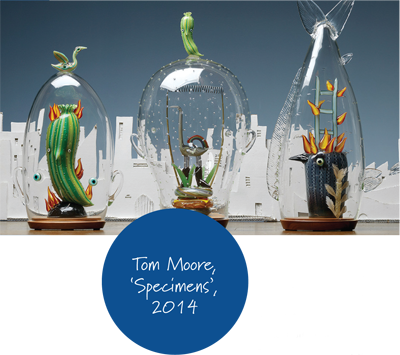
In 2016, I received the Sydney Ball Friends of the South Australian School of Art International Travel Grant. This funding was to undertake fieldwork outside Australia as part of a higher degree research project. Given that my work is based so strongly in Venetian glass techniques and Renaissance culture, I felt there was a great gap in my understanding because I had never been to Europe. The financial support assisted me to make the journey and form the connections I was seeking with source materials, artists and researchers. In 2018, I returned to Venice as a speaker and demonstrator at the Glass Art Society Conference in Murano.
It’s no secret that artists have a public platform through the work they do and having a platform is a great privilege. So please allow me for a moment to use mine….
It’s my conviction that artforms hold a valuable place in our historical cultural landscape and for the unique expressions of human ingenuity. Continued support is critical to grant and scholarship opportunities for those practicing their craft. Generosity can make a huge impact. It can be the jump start that someone needs to explore previously unimagined horizons and change the world.
That’s where you come in. By making a donation to this year’s Scholarship Appeal your act of help can be a game-changer for a young creative person just starting out.
Generosity takes conviction. With everything going on in our busy lives, it requires a certain visionary outlook to think of others.
I wouldn’t be where I am today without the support of donors. Someone invested in me and through that investment, encouraged me to open my mind to untold possibilities. I am inviting you to do the same. When you give, you are saying with your actions that this is important to you – to get behind the next generation of creative minds.
Right now, there are deserving students with worthy dreams and aspirations, and I can assure you a scholarship can be the one thing they need to change their life forever.
Will you support them?




